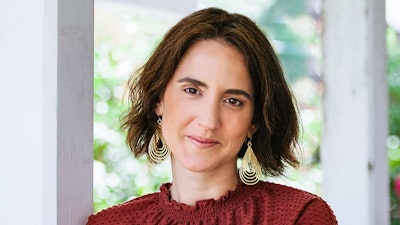The psychological health of young minoritized girls in rigorous academic environments took center stage on the second day of the Whole Girl Education National Conference at Barnard College, with a conversation featuring best-selling author Rachel Simmons.
This year’s Whole Girl Conference, bringing together school leaders, teachers, and all types of educators of girls and gender-expansive youth, is the first ever. The convening was organized by the Student Leadership Network (SLN), a nonprofit helping young people in diverse, underserved communities access higher education. It operates The Young Women’s Leadership Schools (TYWLS), a network of public schools for girls and gender-expansive youth with thousands of students in New York City, as well as Young Women’s Leadership Network schools across the country.
TYWLS use what they call the Whole Girl Education framework, which has four main focuses: early college and career awareness, STEM, health and wellness, and leadership. But an environment of academic rigor can lead to a lot of pressure for young girls, which was the focus of last Friday afternoon’s plenary session.
 Rachel Simmons
Rachel Simmons
“If you don’t have that consciousness, you lose that shield,” said Simmons.
Simmons also suggested that teachers be genuine with students so that students will be genuine with them.
“Don’t act like you have it all together,” she said.
Being a little bit vulnerable can create a psychologically safe environment for students in which they’re comfortable asking for help---which for many students is an interpersonal risk. It’s important, Simmons said, to let them know that it’s O.K. to screw up.
Perfectionism is endemic in the students that Simmons has encountered.
“The overworking tendencies of these girls break my heart,” she said.
The question of how to create balance and to stay mentally healthy is one to which Simmons admitted that she doesn’t have a full answer. But she said that self-care was critical, and that it should not be understood as a reward or something ancillary, but as an essential part of daily life.
“We have to model that, as educators,” said Simmons. “We’re very bad at that. If they don’t see us taking a minute to do that, then it’s really hard for us to make the point to them.”
Setting boundaries is another critical skill for students, Simmons said, including learning how to say “no,” how to say “not right now,” and how to ask what they can deprioritize.
Simmons also spoke about her own work, which has recently expanded to include adult women. Simmons has been doing leadership work and executive coaching at PayPal, focusing on the promotion of women in the workplace, a program that will soon expand to Black and Latinx workers.
“I get to teach mostly white men how to advance under-represented talent,” she said.
Simmons’ work focuses on the idea of sponsorship, a level of involvement beyond mentorship in which more experienced workers directly advocate for protégés, for example, recommending them for high-visibility projects that could lead to promotions.
It’s a concept that can be easily applied to schools, said Diana Beltrani, a conference attendee who was formerly an assistant principal at TYWLS’ Brooklyn school.
“If you’re looking at an AP classes and who should be taking them, you might have students who won’t promote themselves, but the teacher will know that they should be in this class,” she said. Those teachers can make sure that the student winds up with opportunity.
The conference also featured over 20 break-out sessions over its first two days, with a variety of themes. Some touched on administrative skills, like ones on how to engage new staff to retain leaders, how to understand your own leadership style and make it as effective as possible, and how to use national data sets to enhance teaching. Others focused on using the Global Girls’ Bill of Rights as a lens for advocacy work, Black girls navigating white institutions, and creating trauma-informed spaces that foster healing. There were even sessions connecting various skills to dance, improv, and bucket drumming.
The conference concluded with a final round of workshops, including ones on the importance of ritual in building connected communities, cross-classroom collaborations to strengthen belonging, and ways to involve the community in your classroom. The final plenary speaker was Dr. Bettina L. Love, the William F. Russell Professor at Teachers College, Columbia University, whose research focuses on strengthening public education through abolitionist teaching, anti-racism, and Black joy.
Jon Edelman can be reached at [email protected]















